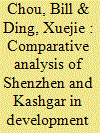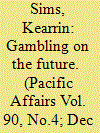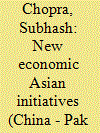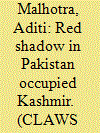|
|
|
Sort Order |
|
|
|
Items / Page
|
|
|
|
|
|
|
| Srl | Item |
| 1 |
ID:
139539


|
|
|
|
|
| Summary/Abstract |
Kashgar, a westernmost city in the restive Xinjiang Uyghur Autonomous Region bordering Central and South Asia, was paired with the southern city of Shenzhen, the most successful special economic zone for its future development. The development of Kashgar’s economy in specific and the Xinjiang in general is a part of China’s new Silk Road project which serves multi-purpose goals, such as narrowing regional disparity, reducing ethnic tensions, fighting terrorism and balancing US pivot to Asia. It is skeptical whether the Shenzhen model can be transplanted into Kashgar. The plan of developing Kashgar’s economy and establishing Kashgar special economic zone may be considered a new bottle with old wine. The development programmes in the past several decades did not address the roots of ethnic tension, including suppression of cultural autonomy and unequal distribution of the benefits and social costs of economic growth. Besides that, the success of the Shenzhen special economic zone is an exception, not a rule. It was unsuccessful in the past attempts to transfer the successful experience from Shenzhen to other special economic zones. It is skeptical whether the Shenzhen experience can be transplanted to Kashgar, whose geographical location and investment environment was much inferior.
|
|
|
|
|
|
|
|
|
|
|
|
|
|
|
|
| 2 |
ID:
117661


|
|
|
| 3 |
ID:
156691


|
|
|
|
|
| Summary/Abstract |
Following the extraordinary wealth generation of casinos in Macau and Singapore, governments and non-state actors across Southeast Asia have developed gambling establishments as a means of fast-tracking economic growth and stimulating national development. Yet, here and elsewhere, casinos have been heavily criticized for their association with immoral behaviour, problem gambling, corruption, and organized crime. In this article, I focus on two casinos in northern Laos to address two research questions. First, I consider how casinos have come to exist within the remote border regions of one of Asia’s least developed countries. I discuss vice economies within the Golden Triangle region, multi-actor aspirations to boost transnational connectivity within continental Southeast Asia, strengthening political-economic relationships between Laos and China, and Government of Laos efforts to use foreign investment as a mechanism for increasing governance capacities in borderlands. Following this, I critically analyze the relationship between casinos and development in Laos. I focus specifically on the multifarious effects of casinos on the lives and livelihoods of local communities to argue that casino development has been informed by logics of expulsion and the establishment of new predatory formations. To make this argument, the article draws on four fieldwork visits to each of the casino sites between 2011 and 2015, desk-based research, and interviews with local residents, casino staff, and members of the Government of Laos.
|
|
|
|
|
|
|
|
|
|
|
|
|
|
|
|
| 4 |
ID:
157622


|
|
|
|
|
| Summary/Abstract |
After the formation of Progressive Party of Maldives (PPM) government in Maldives in 2014 led by the current President Mr. Abdulla Yameen, many developments took place at the political, economic and foreign policy arena of Maldives. The government of Maldives has implemented various polices and embarked on actions having implications for nascent democratic development in the country.
At the political arena the opposition the Maldives Democratic Party (MDP), leader and former President of Maldives, Mr. Nasheed was arrested in 2015 on terrorism charges. The opposition parties formed an umbrella platform Maldives United Opposition (MUO) to mobilise public opinion. Maldives government tried to take control of the situation by passing various laws which targeted opposition members, curtailed freedom of expression and took control over the decision making bodies. Maldives also opted out of Commonwealth membership when asked to end the political crisis through negotiations.
|
|
|
|
|
|
|
|
|
|
|
|
|
|
|
|
| 5 |
ID:
182795


|
|
|
|
|
| Summary/Abstract |
Since the early 1980s, special economic zones (SEZs) in China have benefited from targeted place-based policies intended to promote local employment and economic growth. What remain poorly understood is whether SEZs serve to give birth to new firms, or rather attract and support the re-establishment of firms from other places. To address this question, this paper examines the impact of SEZs on employment growth in rural counties in China. Using ASIF panel data representing the activity of manufacturing firms for the period 1999 to 2008, this paper assesses the employment effects of SEZs according to firm births, relocation, expansion, and firm closure. By matching counties with future SEZs as comparison groups, the difference-in-differences estimates show that SEZs significantly increase employment in rural counties due to the creation of new firms and the expansion of existing large firms; in contrast, SEZs fail to promote firms to move in and restrain firms from moving out. Further, data analysis reveals significant regional heterogeneity, with the employment effects of SEZs on firm entry strongest for the eastern coastal region. Finally, we confirm that SEZs tend to reduce local industrial agglomeration in the eastern and central regions.
|
|
|
|
|
|
|
|
|
|
|
|
|
|
|
|
| 6 |
ID:
161098


|
|
|
|
|
| Summary/Abstract |
This article discusses welfare measures in the formal sector being constrained by
labour legislation which is, at best, empirically fragile. This very fragility requires
us to view labour laws and possible reforms using conceptual frames that are not
preoccupied with de jure legislation but rather focus on the actual implementation
of the law considering judicial and executive practice. Various factors taken
together complemented by empirical work in Gujarat reflect that while labour
laws are supposed to be operational in a special economic zones (SEZ), they are
almost absent in practice. This study is based on both theoretical and empirical
methods. This study suggests systematic non-implementation of labour welfare
measures that have a negative implication on workers in each and every way
possible. This has led the workers in SEZs to earn their living in an atmosphere
of threat, fear and uncertainty.
|
|
|
|
|
|
|
|
|
|
|
|
|
|
|
|
| 7 |
ID:
104107


|
|
|
|
|
| Publication |
2011.
|
| Summary/Abstract |
Left front's 2009 Lok Sabha poll debacle in West Bengal, India
This paper demonstrates that left front is no longer unassailable in West Bengal after three decades of rule. It identifies the specific reasons for the Left front electoral debacle in the 2009 Lok Sabha elections. The paper also argues that the left front is caught between the contrasting imperatives of adapting to changing socioeconomic conditions in liberalizing India, while concurrently attempting to remain true to its traditional communist ideology and support base in a globalized world
|
|
|
|
|
|
|
|
|
|
|
|
|
|
|
|
| 8 |
ID:
151159


|
|
|
| 9 |
ID:
118458


|
|
|
| 10 |
ID:
169142


|
|
|
|
|
| Summary/Abstract |
In the Mekong Region, the Asian Development Bank and partners have promoted economic corridors as a way to achieve regional economic integration and growth. This study evaluates how a transboundary policy narrative of shared prosperity around the East–West Economic Corridor programme emerged, and then how it was elaborated and used, taking a set of border policies of the government of Thailand as cases. For two decades the shared prosperity narrative has been used by a coalition of elite actors to support a programme of investments in road infrastructure, as well as to push for agreements on trade, border logistics, investment and tourism. The shared prosperity narrative has helped maintain support for the programme despite its failures to meet projections and expectations. Although criticised by civil society and experts from time to time, no coherent shared counter‐narrative emerged. Policy elites in Thailand have used the transboundary narrative to justify investments in special economic zones, and transport infrastructure near the border and inside neighbouring countries. Thailand has also reproduced the narrative in support of efforts to bolster tourism cooperation, and negotiate cross‐border trade and logistics agreements. Roads and bridges have been built, underlining how discursive practices have material consequences and reinforce the narrative.
|
|
|
|
|
|
|
|
|
|
|
|
|
|
|
|
| 11 |
ID:
128642


|
|
|
| 12 |
ID:
187191


|
|
|
|
|
|
|
|